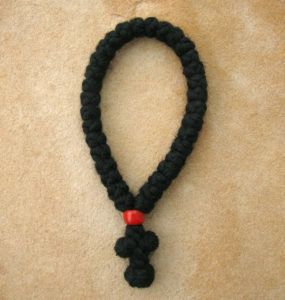17 November OS 2018 – Nativity Fast; Friday of the Ninth Week of St. Luke; St. Gregory, Bishop of Neo-Caesaria the Wonderworker; St. Lazarus, the Iconographer and Confessor; St. Gennadios I, Patriarch of Constantinople
In today’s Gospel, the Lord warns us sternly against offending our brother:
The Lord said, Ye are they which justify yourselves before men; but God knoweth your hearts: for that which is highly esteemed among men is abomination in the sight of God. The law and the prophets were until John: since that time the kingdom of God is preached, and every man presseth into it. And it is easier for heaven and earth to pass, than one tittle of the law to fail. Whosoever putteth away his wife, and marrieth another, committeth adultery: and whosoever marrieth her that is put away from her husband committeth adultery. Then said he unto the disciples, It is impossible but that offenses will come: but woe unto him, through whom they come! It were better for him that a millstone were hanged about his neck, and he cast into the sea, than that he should offend one of these little ones. Take heed to yourselves: If thy brother trespass against thee, rebuke him; and if he repent, forgive him. And if he trespass against thee seven times in a day, and seven times in a day turn again to thee, saying, I repent; thou shalt forgive him. – St. Luke 16:15-18, 17:1-4
St. Theophan the Recluse points out that we offend and condemn others all the time, and we do not think about it, and yet these two sins are very hateful to God:
…Two sins which are very great in the eyes of God are not regarded as anything by people: offending and condemning. The offender, according to the word of the Lord, would be better off dead; he who condemns is already condemned. But neither the one nor the other think about it, nor can they even admit that they are sinful in any such thing. Indeed, what blindness surrounds us, and how carelessly we walk in the midst of death! Thoughts for Each Day of the Year, pp. 258-259
How can we avoid these extremely common falls? The most powerful antidote is attentiveness. Let us assume that we are not uncommonly malicious (i.e., that our bad will is weak, just as our good will is weak- the state of most people, including the baptized), that we fundamentally intend to think and do well towards others, and that we fall into condemning and offending through the weakness common to all men. This usually occurs because we are not leading an attentive life. When we are not in a prayerful state, our minds being drawn out of ourselves, broken, and scattered over a thousand shifting impressions, we lose control of our thoughts, feelings, and actions. In such a state, we cannot help but say and do that which offends, and at the same time condemn others in our thoughts and speech.
As we begin this holy fast to prepare for the Lord’s Nativity, let us ask the Lord to strengthen our weak will, and let us make a firm resolve to lead an attentive spiritual life, whose foundation is continual prayer. Having said our morning prayers, let us take the Prayer of Jesus with us through the day, repeating it as often as possible – silently, of course, when in the midst of others, but repeating it nonetheless. This all-powerful weapon, the Name of the Lord, will cleanse and concentrate the mind, make us more aware of ourselves, and give us the lively sense of the Presence of the Lord, so that we will fear to offend Him and drive away this most desired Guest of the soul, by any offensive thoughts, words, or deeds directed to our neighbor.

